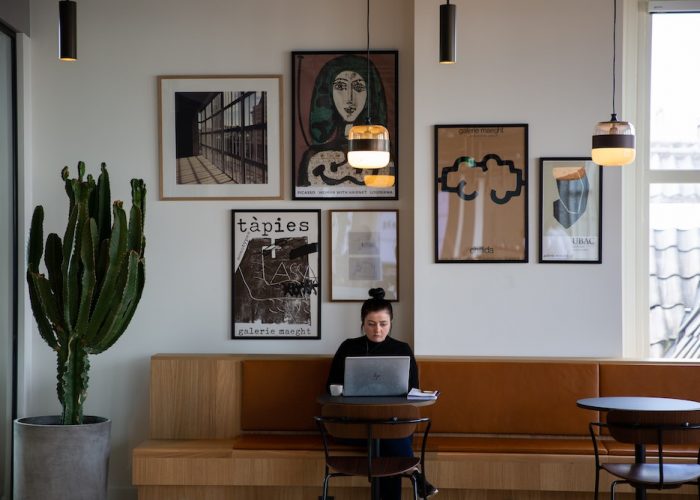Flexibility in work has never been more important or sought after than it is today. Freelancing has become a popular option for many across the globe, including the UAE. In fact, Dubai is witnessing a freelance revolution. Dubai-based online marketplaces attracted talented professionals who have the opportunity to connect with clients and start their careers. Just Bawabba alone has over 4,000 freelancers. Numbers also show 65% of freelancers in the UAE are in Dubai.
About 16% of the UAE freelancers are in Abu Dhabi and 13% in Sharjah. The freelance market is expanding in line with the global trend, but you’re probably trying to weigh out all the reasons to freelance in the UAE. Our previous post elaborated everything you need to know about remote work in Dubai, and in this article, we’re going to focus on reasons to be a freelancer in the UAE.
What are the top reasons to freelance in the UAE?
Becoming a freelancer is a major life decision for every person. Contrary to popular belief, freelancers do not sit in their pajamas typing on a laptop all day. Freelancing is a lifestyle and requires a great deal of professionalism. This form of work offers a lot of advantages. Below, you can see why to become a freelancer in the UAE. So, let’s start.
1. The only boss you have is yourself
Probably the biggest reason people start freelancing is the need to experience freedom. At a “regular” job, you have a boss or manager overseeing everything you do. That boss or manager navigates the workflow in the direction they deem the best. You don’t really have that much liberty to make your own decisions. In other words, you are there to perform tasks, processes, and other activities that others have chosen. Most workplaces don’t allow you to do things your way. Understandably, you feel overwhelmed in these situations.
As a freelancer, you don’t have a boss; you have a client (or more of them). You are in charge of your affairs. At the same time, you have the liberty to navigate your career and every project you take in a way you find the best. You are the one who chooses how to complete a project. That way, you can adapt the task at hand to your core strengths and finalize it successfully. As your own boss, you are the one who determines what’s best for you.
2. No more office politics
Workplace politics exists in almost all organizations and businesses, regardless of how big or small they are. While its main intention is to set rules for accepted behaviors to create a balance and a productive environment where people respect one another, the reality is entirely different. Office politics can make people miserable. For many employees office, politics is the worst thing about their “regular” job.
Indeed, the disadvantages of workplace politics are numerous, including:
- Decreased productivity
- Increased stress
- Stunted business growth
- Negative employee attitudes
- Demotivation
- Impaired concentration
When you become a freelancer, you move away from office politics. That way, you also move away from all disadvantages associated with it.
3. Capitalizing on your strengths and skills
The early stages of your freelance career are all about finding yourself first. What does this mean? It means you are yet to identify your core strengths, skills, and talents. Sure, just by choosing a career in freelancing, you have a pretty good picture of your skillset. But, as you’re developing your career, you will also learn new things about your work ethics and core strengths that can only benefit you in business. This is not something you can do at a “regular” job because there’s no liberty to explore anything besides the task at hand. As you identify and work on your strengths and skills, you also learn more about weaknesses to work on. All this allows you to continually improve, be better, and do more.
4. Richer career
A regular “nine to five” job doesn’t leave a lot of room for maneuvering and enriching your career. Most people spend years at the same place, working for the same boss, doing the same assignments. Day in and day out! Although this kind of job may seem like a stable and secure option, it doesn’t do much for your career. Freelancing is an excellent solution if you want to enrich your career and professional development.
How?
As a freelancer, you are not tied to one client. You have the opportunity to work with multiple clients, all of whom have different needs and projects. With each new client and project, you gain more experience. You also boost your portfolio and take your career to levels it would be impossible to reach with a “regular” job.
5. Time flexibility
One of the most important benefits of becoming a freelancer is the flexibility of time. You get to work at your own pace. In fact, there’s no right or wrong time for work here. It all comes down to you and when your productivity and concentration are at their highest. Some people prefer working early in the morning while others do most of their work at night. Since you’re not tied to specific work hours (usually nine to five), you have the liberty to work whenever you want.
Time flexibility is also observed through the project completion. The client has a certain deadline in mind, and you get to plan and complete your work when it suits you. As long as you meet the agreed-upon deadline, you are fine. There is no strict work schedule. You are the one who sets up the schedule for yourself.
6. You can work anywhere
The beauty of freelancing is that you can work anywhere you want. All you need is a computer or laptop with the software necessary for your work and a stable internet connection. Freelancing allows you to travel and still keep making money. You aren’t bound to an office or a cubicle. The whole world is your office, if you will. One day you can work at home, and the next day you feel like going outside for a cup of coffee. You take your laptop and work there. Options are truly endless.
7. Turn your passion into a career
Some people start their freelancing careers doing the jobs they got an education for. Others decide to turn their passion into a career. For example, you may be an English teacher, but your passion is programming, and you’re talented at it. Nothing is stopping you from relying on your talent, skills, and strong work ethic to become a freelancer. This is especially the case in the UAE, one of the most progressive business environments in the world.
8. Better work-life balance
The flexibility of time, working at your pace, and ability to work anywhere make it easier to improve work-life balance. This is particularly important for housewives and stay-at-home moms who want to develop and improve their careers but also have children to take care of. You, as a freelancer, take projects you’re comfortable working with, or you’re certain you can complete an agreed-upon deadline. In other words, you are the one who determines your workload, and you can modify it in a way that helps you improve your work-life balance. That’s the beauty of freelancing.
9. You choose the clients
At a standard job, you can’t choose your boss, but as a freelancer, you can. Whether you work via a platform or any other way, you’re not obliged to work with all clients who contact you or send the offer. Instead, you can pick and choose. That way, you can work with clients you want and avoid working with clients with whom you don’t wish to collaborate. These prospects get even bigger and more versatile as your freelancing career takes off and marks continuous progress.
10. No unpaid overtime
Salaried employees are often required to work overtime, and in most cases, they aren’t even paid for it. As if staying at work later than intended is their obligation, no questions asked and no money paid. Freelancers have it differently. You are paid for every hour of work. Or, if you work on a fixed-price project, you are paid for every milestone or completed assignment. You don’t work unless you’re paid. That’s the difference here.
11. Higher Income
Most freelancers take every work they can get when they start freelancing. They may not earn much. But, as they move from one client to another, project by project, and enrich their careers, they start earning more money. In fact, you may get paid more than an employed counterpart for the same work. And you, most certainly, deserve so. You buy your own equipment and pay all your expenses. For that reason, your rate is and should be much higher.
How do I be a freelancer in the UAE?
Now that we’ve gone through some of the most important reasons to be a freelancer in the UAE, you’re probably wondering how to do so. We’re going to help you out below.
UAE residents
To freelance in the UAE, the first thing you need to do is to make a firm decision. Keep in mind freelancing is a rewarding but still challenging career path. These tips can help you out:
- Find a platform – for most freelancers, the easiest way to start a freelancing career is to join an online marketplace.
- Send portfolios and resumes – it’s practical to have a portfolio and resume, or even a motivational letter, and send it out to potential clients in your niche.
- Focus on your skills – many freelancers write too much about themselves instead of focusing on their skills. At the end of the day, a client really wants to know what you can do for them. So make sure your skills, portfolio, and relevant experiences take the prominent job on your profile/resume.
- Join groups and communities – starting as a freelancer isn’t just about waiting for that first opportunity. You should join groups and online communities where freelancers gather. Give constructive answers and build a reputation. You may end up collaborating with someone.
- Apply to jobs – look for jobs on platforms and off them, and apply only to those you are confident you can do. Never apply to a job that you’re insecure about
- Focus on establishing good relationships with clients – freelancers don’t need to work with the same person all the time, but it’s a great idea to establish good relationships with your clients. That way, you can get more work, and they’ll recommend you to their associates.
Non-residents
If you are a non-resident who wants to freelance in the UAE, you will need a UAE freelance visa and freelance permit first. A freelance permit in the UAE allows a person to work on their own as an independent contractor or sole practitioner. Of course, this also implies you need a residence visa. A freelance permit is offered by selected free zones, and the package allows a freelancer to base him/herself in the free zone either by renting an office space or using a Flexi-desk surrounded by other businesses who may seek a specific freelancer’s services.
The term free zone refers to geographically demarcated areas in the UAE, allowing 100% foreign ownership, and is dedicated to a specific industry, in most cases.
The UAE has 45 free zones, but freelance permits are issued in eight:
- Abu Dhabi (Twofour54)
- Dubai (Dubai Academic City, Dubai Design District, Dubai Knowledge Village, Dubai Media City, Dubai Studio City)
- Fujairah (Fujairah Creative City)
- Umm Al Quwain (Umm Al Quwain Free Trade Zone)
Eligibility criteria for the freelance permit in the UAE
You’re a non-resident who wants to freelance in the UAE? To do so, you need a freelance permit, without which you can’t get a UAE freelance visa.
To obtain a freelance permit in the UAE, you need the following:
- Application form
- Business plan focusing on the chosen freelance activity
- CV
- Passport copy and visa page
- Three reference letters by current or previous employers and other people you worked with but who can recommend you and confirm your skills in a specific field
- Bank reference letter confirming you have a satisfactory account
- Bank statement (last three months)
- Samples of work (portfolio)
If you are a UAE resident, you will also need a No Objection Letter (NOC) provided by your sponsor if you’re applying for a Dubai freelance permit.
NOTE: you will need to translate and submit the documents in Arabic.
You need to submit your application at the relevant free zone. If provisional approval is permitted, you will get a customer confirmation from the authority in the respective free zone. Then, you need to sign the confirmation letter and give it alongside other documents mentioned in it for final approval. This also includes making all necessary payments (freelance permit fee, visa sponsorship fee, and (if required) first installment for office space). You will also need to sign the free zone sponsorship agreement and collect your permit and visa. A permit is usually issued within seven to 10 business days, but the exact timeframe may depend on one free zone to another.
To work as a freelancer in the UAE, you need to apply for a permit that refers to specific business activities. At this point, the freelancer license allows you to conduct 48 business activities in the emirates. Most activities are media- and IT-related.
Every free zone may have its own specific rules, but they have many things in common too. Let’s take Dubai and Umm Al Quwain (UAQ) free zones as an example.
To apply for a UAQ freelance permit, you don’t need NOC from the sponsor, but for Dubai free zone, you do. Also, UAQ doesn’t require a shared desk, while Dubai free zone does. Visa validity associated with UAQ freelancer permit is two years, and in Dubai free zone three years.
Both free zones include sponsorship of dependents, personal bank account and do not require auditing or bookkeeping. You can get your UAQ free zone permit in four to five business days and Dubai’s 25 to 30 business days. The cost of the UAQ permit is AED 22,000 and Dubai AED 35,000.
Conclusion
Reasons to freelance in the UAE are numerous, ranging from flexibility to professional development. Starting a freelance career in UAE requires a freelance visa and a permit which you can obtain from selected free zones.






